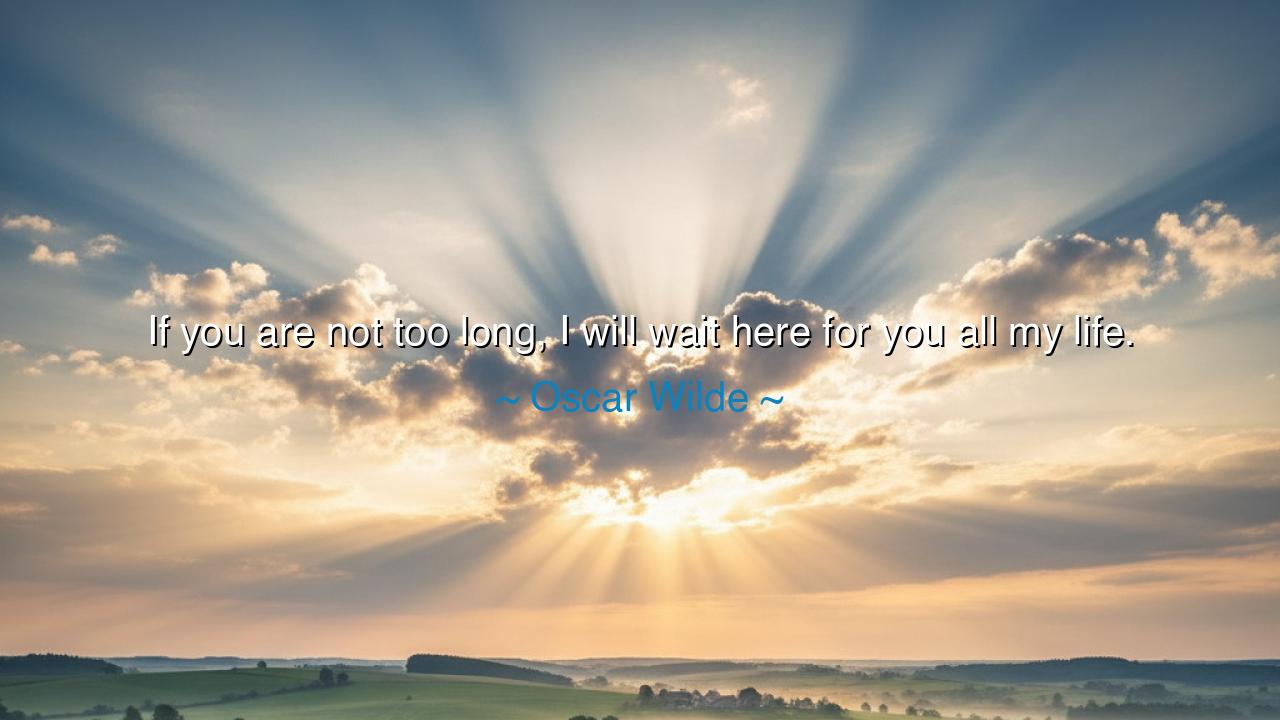
If you are not too long, I will wait here for you all my life.






The words of Oscar Wilde, “If you are not too long, I will wait here for you all my life,” are the language of devotion clothed in wit. They seem light, for Wilde was a master of playful phrasing, yet beneath their charm lies a truth as ancient as the stars: that love, once awakened, knows no measure of time. This sentence is both a jest and a vow. It laughs at the delay of the beloved, yet it also declares that waiting—even until the end of life—is no burden when one’s heart is bound by loyalty.
The origin of this quote comes from Wilde’s brilliance at weaving paradox. He lived in an age of elegance, irony, and artifice, yet he never ceased to strike at deeper truths beneath his playful masks. In this saying, he reveals the paradox of love: though it longs for immediacy, it also endures delay with infinite patience. The lover mocks time, saying, “Hurry, for I am eager,” yet in the same breath confesses, “I shall endure eternity, if only for you.” What could be more powerful than such a pledge? It is the heart’s way of saying that presence is everything, but absence, even long, cannot undo devotion.
The ancients knew of such devotion. Penelope, wife of Odysseus, waited twenty years for her husband’s return from Troy and his long wandering upon the seas. Many suitors pressed upon her, urging her to forget, to choose another, to abandon her vigil. Yet she held firm, weaving and unweaving her loom by day and night, declaring by her actions that no absence was too long. She embodied Wilde’s words before they were ever spoken: if Odysseus was “not too long,” she would wait her whole life. And when at last he returned, her patience proved more radiant than all the years of sorrow.
This quote also speaks to the courage of those who wait in other walks of life. Think of mothers waiting for sons sent to war, of families waiting for those who labor far away, of souls waiting for justice delayed but not denied. In their vigil there is pain, but also greatness. For to wait with love is not to waste one’s life—it is to hold a flame alight against the winds of despair. Wilde’s playful phrase becomes, in their lives, a hymn of endurance.
What, then, is the lesson for us? It is that true love, whether of a person, a dream, or a cause, is measured not in days but in depth. If your heart is steady, no span of absence can diminish it. To live in such loyalty is to conquer time itself. But beware: waiting is not passive. It is an active discipline, a daily choice to keep faith, to nourish hope, to guard the soul against bitterness. Wilde’s words remind us that patience, though tested, can be luminous.
Practical actions flow from this teaching. If you wait for someone, wait with dignity—build your life even as you hold space for their return. If you wait for a dream, labor in small steps while time works its hidden alchemy. If you wait for justice, speak and act where you can, but let endurance be your shield. The heart that waits is not idle; it is steadfast, and in its steadfastness it grows strong.
Thus, O listeners, take this ancient wisdom clothed in Wilde’s wit: love transcends time. If your cause is worthy, if your beloved is true, then the years themselves become your companions, not your enemies. Say, as Wilde said with both jest and sincerity: “I will wait, whether it be a moment or a lifetime.” And in that vow lies the secret of the eternal—patience that shines like gold, devotion that no delay can diminish.
For in the end, to wait all your life for what is truly precious is not loss, but the highest form of victory. It is to say to the universe: I am constant, I am faithful, I endure. And that endurance is the very mark of love’s greatness, greater even than time.






AAdministratorAdministrator
Welcome, honored guests. Please leave a comment, we will respond soon